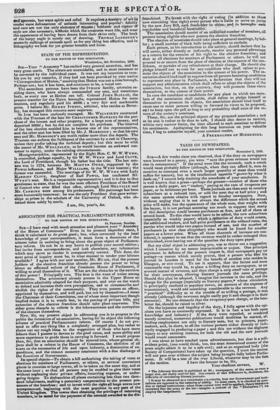TAXES ON NEWSPAPERS.
TO THE EDITOR OF THE SPECTATOR. November 2, 1830.
Srn—A few weeks since you observed, that if the duty on newspapers. were lowered to a penny, you were " sure the gross revenue would not rise in consequence." If the mind were like the stomach, such a result would most probably follow (although, when they can afford it, men do contrive to consume even a much larger quantity of meat than would suffice for nature), but as the intellectual appetite " grows by what it feeds on," I cannot help doubting the soundness of your conclusion. It is well known that a great—perhaps the greater—number of those who peruse a daily paper, are " readers," paying at the rate of twopence per paper, or in strictness per hour. These journals are then sent to country subscribers at a reduced rate, or sold the next day at half price ; and the same system obtains With regard to Sunday newspapers. Now without urging that it is not always the difference which the actual. price will make, but the appearance of the whole sum, that weighs with the buyer, it is not perhaps assuming too much to suppose that many of this description would become purchasers at first, and all of them at second-hand. To this class would have to be added, the new subscribers (especially to weekly papers) which a st.clection of duty would create, the additional readers, and half-price purchasers at the reduced rates, the parties who would take two papers instead of one, and the number of purchasers (a new class altogether) who would be found for smaller papers at a lower price. When all these channels of increase are con- sidered, it appears to me that the revenue would be rather enlarged than diminished, even leaving out of the question the duty upon paper.
But my chief object in addressing you, was to throw out a suggestion which I conceive by no means impracticable or unjust. One principal argument in defence of the present impost is, that newspapers pay no postage—a reason which merely proves, that a person who files his journal in London is taxed for the benefit of another who resides in Glasgow, or vice versa. To me it appears, that the fairest and most reasonable way would he, to place a trifling duty on newspapers, as an avowed matter of revenue, and then charge a very small rate of postage for their conveyance, allowing literary journals the same privilege. Should this plan be adopted, I imagine the increase in the sale, and the charge for the postage (especially on literary papers,* whose circulation is principally confined to populous towns, on account of the expense of transmission), would add something considerable to the revenue. Any "practical" difficulty as to the trouble of so trifling a postage, is met. already (although the newsmen might easily pay it and charge it in their accounts). No one demands that the twopenny-post charge, or the late- letter fee, should be raised to silver. On the injustice and impolicy of the duty, I fully agree with the opi- nions you have so constantly expressed. It is in fact a tax both upon. knowledge and industry:1- If the duty were repealed, or rendered merely nominal, numerous publications would doubtless be started, af- fording employment not only to literary men, but to printers, paper. makers, and, in short, to all the various persons either directly or indi- rectly engaged in producing a paper ; and this too without the slightest. injury to any existing interest, for both the old and the new journals would create consumers.
I was about to have touched upon advertisements, but that is a self- evident point, (one would, think, too, the most determined enemy of the- press might admit it to be a safe one); and as an organized body (the Society of Compositors) have taken up the question, I trust the session will not pass over without the subject being brought fully before Parlia- ment. It will be a test of the true Liberal, whatever may be the fate.
of the motion. I have the honour to be, Sir, Your obedient servant, W.
* The Literary Gazette is published at 8d.; newspapers of the same, or even a- larger size, are really sold for 3fd. One reason of this difference is, doubtless, the- difficulty of circulating literary journals. t It may be observed as a remarkable s:n2;nlarity, how our Government and insti- tutions are opposed to the industry of ability. In most cases, it is checked by posi- five or virtual restrictions : when these cannot very well be applied, (fancy literature recruited like the army or the bar—imagine a journal of the Exclusives 1") we employ the taxgatherer.


























 Previous page
Previous page